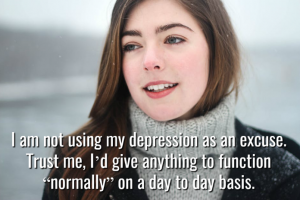Depression: 8 Ways To Reach Out For Help!

Depression is overwhelming and dealing with it alone can be scary, but you are not alone. According to the World Health Organization, more than 300 million people battle with it globally. Admitting you have a problem is the first and hardest step. Talking to people makes you vulnerable, but by doing so allows them to be part of your life, no matter how painful it is. Being open to trustful individuals can be a game changer because not only talking about it can be therapeutic, but you are also receiving support. You don’t need to deal with depression alone. Remember you deserve happiness. The following are 8 ways to reach out when depressed:
 Talk to supportive people: It can be a friend, family member, teacher, coach, school nurse, or counselor. At times those closest to you may not be willing to understand. If that is the case, look for people you know can be trusted. For example, if your parents aren’t listening then talk your favorite teacher for instance. Don’t be scared about opening up, you don’t need to give all the details or say you’re depressed. You can express that things have been tough and that you’re having a hard time coping with the situation. The correct people will be supportive and empathic.
Talk to supportive people: It can be a friend, family member, teacher, coach, school nurse, or counselor. At times those closest to you may not be willing to understand. If that is the case, look for people you know can be trusted. For example, if your parents aren’t listening then talk your favorite teacher for instance. Don’t be scared about opening up, you don’t need to give all the details or say you’re depressed. You can express that things have been tough and that you’re having a hard time coping with the situation. The correct people will be supportive and empathic.- Call a helpline line: Most countries have specialized support lines where you can call and receive help from trained people or counselors. These are confidential services, so you don’t need to worry about third persons finding out. Keep in mind there are various hotlines for specific situations such as depression and suicide, among others. Talking to trained individuals will give you the opportunity to learn about depression, and what can be done about it.
 Join support groups: It’s a relief being able to communicate what you’re going through to individuals who go through the same thing. Hearing similar stories allows you to see your situation through different perspectives. Not only that, but you will receive valuable feedback from the members. There are numerous types of specialized groups; such as depression, anxiety, bipolar and much more. So join a group that matches your needs.
Join support groups: It’s a relief being able to communicate what you’re going through to individuals who go through the same thing. Hearing similar stories allows you to see your situation through different perspectives. Not only that, but you will receive valuable feedback from the members. There are numerous types of specialized groups; such as depression, anxiety, bipolar and much more. So join a group that matches your needs.- Online forums: There are occasions in which it is challenging for you to verbally explain your feelings and that’s okay. You can look for forums or groups that empower you through writing. It gives you the opportunity to anonymously write about your circumstances and receive replies from people who have been through similar situations.
- School/University counselor or psychologist: There are many educational systems that offer counseling or psychology services to their students. This is an excellent resource to use. Going to your school’s counselor can be of immense help. They can provide a safe space for you to vent out and guide you through depression.
 Charities: There are many organizations that offer help. Look online for relevant charities or those that operate locally to you. They offer educational activities and various services to those affected. These organizations work for the common good, and many of them bring people together who care about making a difference in people’s lives.
Charities: There are many organizations that offer help. Look online for relevant charities or those that operate locally to you. They offer educational activities and various services to those affected. These organizations work for the common good, and many of them bring people together who care about making a difference in people’s lives.- Talk to your doctor: If you would like to go to a psychologist, and don’t know how to start. You can always go to your primary doctor and let them know what you are going through. They can help by pointing you to the right direction and may even do lab work to make sure you don’t have any deficiencies that could be contributing to your depression.
 Medical plan/insurance provider: Another option is calling your medical plan. They should be able to explain your coverage and provide a list of mental health professionals they cover.
Medical plan/insurance provider: Another option is calling your medical plan. They should be able to explain your coverage and provide a list of mental health professionals they cover.
Don’t feel guilt or shame for reaching out. The pain you feel is not a sign of weakness. On the contrary, you are strong for making it this far. Depression is an isolating illness and getting support will give you the strength to continue getting better. No matter how distant you may feel. There is always someone who loves you. If you ask for help and didn’t receive the response you were hoping for, don’t lose hope. Talk to someone else who will take you seriously. Have these options worked for you? What other ways do you reach out for help? Let me know in the comment section below.
Related: Super nice things to do for someone withe depression / 10+ things people with depression understand all too well
Checkout Psych2Go’s Latest Video On Depression
For more psychology and mental health videos checkout our YouTube Channel: Psych2GoTv
Did you know Psych2Go has a book about Mental Health Recovery?
 Check it out here: Mental Illness Recovery Book, “Something I truly enjoyed about this book is the simplicity and the variety of stories which are all focusing in one subject; mental illness. It’s amazing to see how this book connects each story to one another and to the reader. It provides a direct insight of living with mental illness and tips on how to overcome some disorders. If you feel lost, or if you want to help a friend or family member then this is the book for you.” -Carelyn
Check it out here: Mental Illness Recovery Book, “Something I truly enjoyed about this book is the simplicity and the variety of stories which are all focusing in one subject; mental illness. It’s amazing to see how this book connects each story to one another and to the reader. It provides a direct insight of living with mental illness and tips on how to overcome some disorders. If you feel lost, or if you want to help a friend or family member then this is the book for you.” -Carelyn



Responses